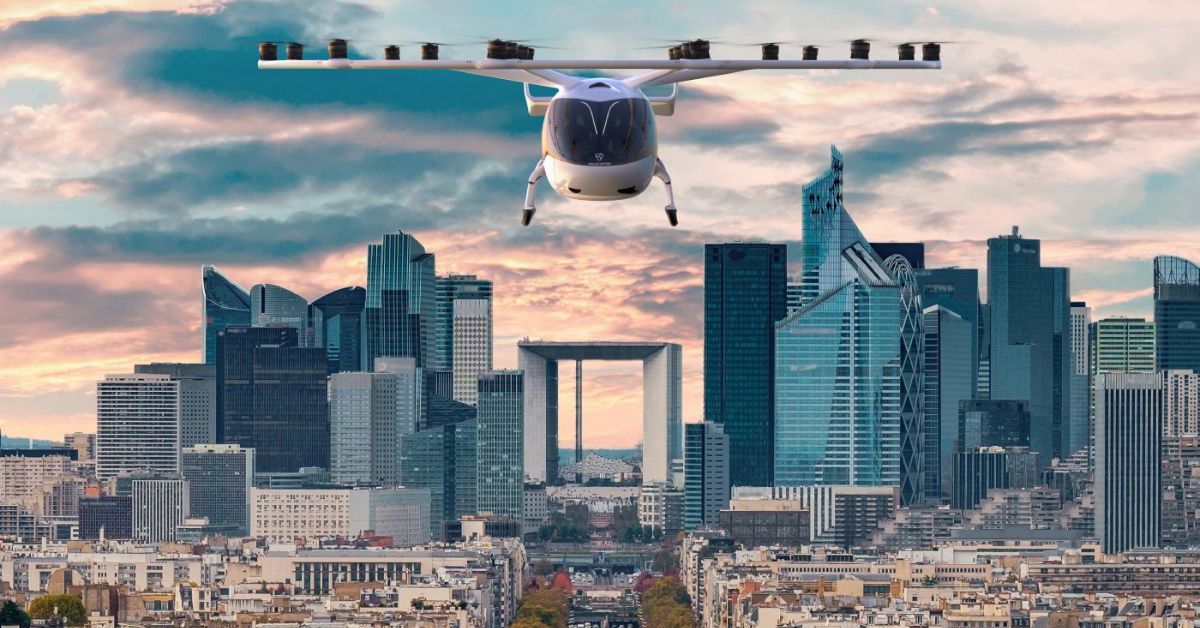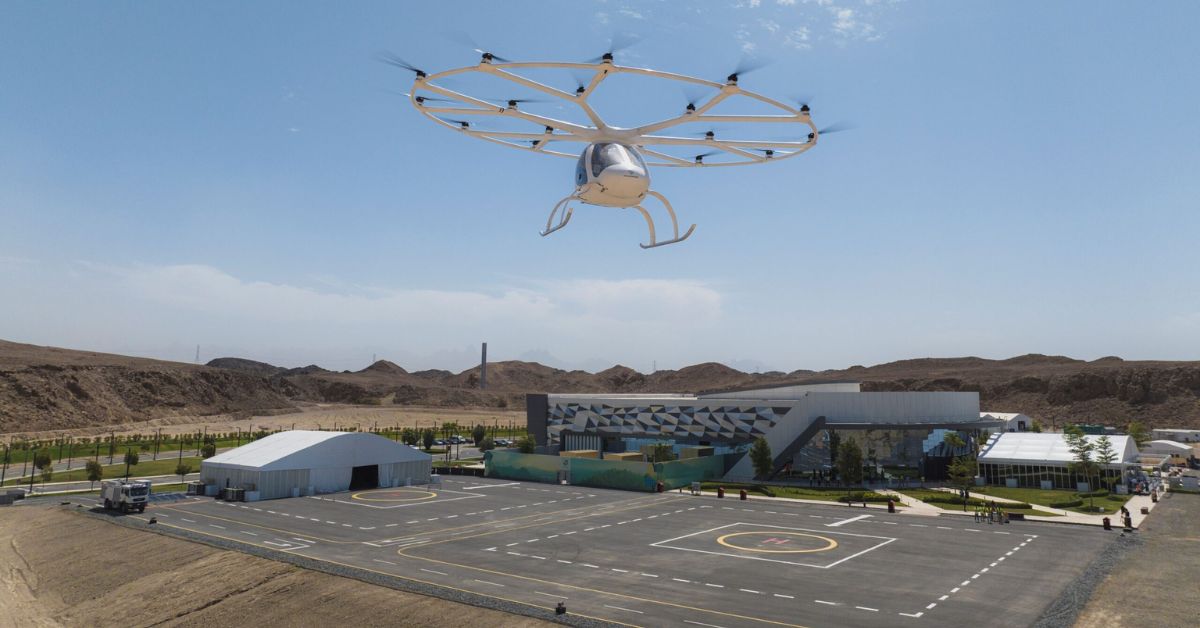RIYADH, SAUDI ARABIA — Flying taxis sound like a Hollywood science fiction trope, but they are on the brink of reality in Neom, Saudi Arabia. This future-forward city is the backdrop for the German air taxi manufacturer Volocopter’s recent series of flight tests, marking the first foray of eVTOL (electric vertical take-off and landing) aircraft into Saudi Arabian skies.
A symbol of the Kingdom’s drive towards sustainable and intelligent mobility, this development shines a spotlight on Saudi Arabia’s accelerating pace of change.
Daniel MacGregor, Chief Growth Officer at Serco Middle East, shared his insights with TRENDS, acknowledging the phenomenal transformation within Saudi Arabia. “The Kingdom is very focused on positioning itself for future success, and the visions of the forward-thinking leadership have accelerated this,” he said.
He pointed to significant infrastructural developments, such as the King Salman International Airport, the Red Sea Development Project, and the Riyadh Metro, which are reshaping the nation into an urbanization hub and a burgeoning center for leisure and business.

“The significant investment in infrastructure upgrades has been exciting to see. King Salman International Airport, the Red Sea Development Project, and the Riyadh Metro are just a few of the many development initiatives that are transforming the Kingdom into a center for urbanization, leisure, and business,” he said.
Market demand
He added that a significant airspace modernization program is also underway to keep up with demand and growth. “As a result, airport and land transportation system updates provide a great platform for preparing for future mobility systems, which will become increasingly important as more giga projects occur,” MacGregor pointed out.
Neom, in conjunction with Volocopter, seeks to establish itself as a global living lab for future transportation. The pair have entered a joint venture since 2021, focusing on scaling advanced air mobility. “The concept of flying air taxis is garnering so much attention,” MacGregor said, “as the eVTOL aircraft are the epitome of futuristic urban air mobility.”
He further emphasized the eco-friendly credentials of the eVTOLs, as they align with Saudi’s sustainability goals. However, the introduction of such a novel technology is not without its challenges.

“The concept of flying air taxis is garnering so much attention, as the eVTOL (electric vertical take-off and landing) aircraft are the epitome of futuristic urban air mobility,” MacGregor explained. “Powered by renewable energy sources, they align with the Kingdom’s sustainability goals, and the announcement that this mode of transport will be used for transportation in NEOM is a fantastic stride forward for developing the first environmentally friendly aviation system,” he said.
As MacGregor explained, a whole range of infrastructure upgrades will be necessary to support this development, such as the introduction of ‘taxi ports’. Neom, being a city developed from scratch, has the unique opportunity to integrate these features into its foundational design.
“In an environment like NEOM, where the transportation network is being built from scratch, this can be factored in from the start,” he said, “whereas in existing congested urban environments, where space challenges are prevalent, this will need careful planning.”
Nevertheless, the more significant infrastructure development required from an airspace perspective will be around air traffic management – and protecting the ‘invisible infrastructure’ of the skies.
“The navigation of the safe movement of people around what is already an increasingly congested air space will need to be looked at to ensure the transport method is fit for purpose and sustainable for the long term.”
Moreover, with the increasing population growth and the news that flying taxis will be used for transportation in NEOM, the air space will need to accommodate many eVTOL aircraft while embracing technology such as AI and machine learning to scale.
Additionally, the government of the Kingdom, through the General Authority for Civil Aviation (GACA) and the Public Transport Authority, should develop new regulations to ensure the safe and efficient movement of people and goods in collaboration with other national security agencies.
Challenges
Yet, the greatest challenge may be managing an increasingly congested airspace. This will require careful planning and the integration of advanced technology, such as AI and machine learning. The Kingdom’s government will have to work hand-in-hand with private sector operators to ensure safe, efficient movement of passengers.
“There are several challenges when it comes to flying air taxis in the Kingdom,” MacGregor says.
The need to meet stringent safety and certification standards, as well as comply with local ordinances against excessive noise, are among the challenges that eVTOLs face.
Also, the range and speed of eVTOLs, as well as their frequency of flight levels and routes, must be competitive with established transportation options.
Additionally, there is also a lack of private sector operators entering this space at the moment. The private sector needs to have more of a seat at the table when it comes to eVTOLs as they will be able to bring their own capabilities, expertise and experience in air navigation, mobility, and customer experience to ensure a safe and sustainable experience for all.
“Government leaders must therefore work closely with the private sector to develop an operational infrastructure that is tailored to the specific locations the eVTOLs will be flown. Only then can an effective transportation experience for people be efficiently and safely deployed,” he said.
Coupled with this, there is also the interface with the military – with more aircraft in the airspace, there will be a clear need to work closely with defense and security entities to ensure that whilst the needs for eVTOLS are being met, military needs are not being compromised.
Opportunities
Despite these challenges, the opportunities ahead for the future of air taxis in the Kingdom are limitless, as MacGregor stated. “While we already have commercial space flight, electric vehicles, driverless vehicles in testing, and drone-led logistics, eVTOLs have a clear opportunity to become the next evolution.”
He predicted that as the various developments begin to launch, we could see eVTOLs operating at a rate of 25-30 per day, particularly at NEOM.
As Neom and the rest of Saudi Arabia continue to innovate and grow, the dream of flying taxis may soon become an everyday reality. This green mode of transportation, powered by 100% renewable energy, could revolutionize mobility, making it more sustainable and seamlessly connected.








